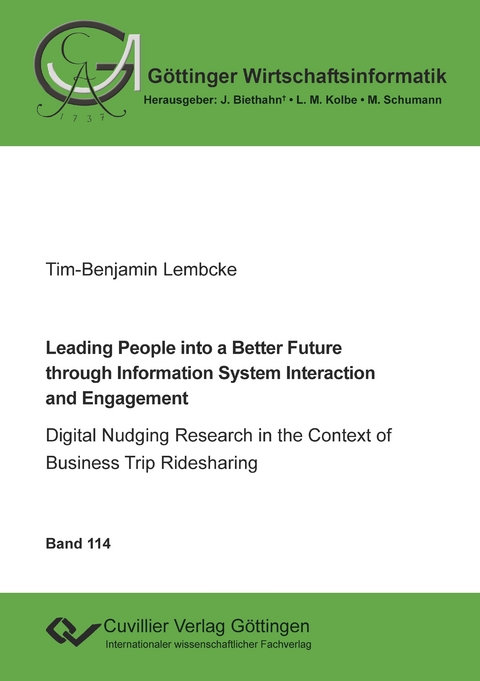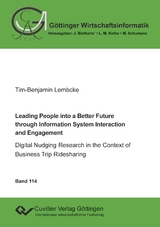Leading People into a Better Future through Information System Interaction and Engagement
Digital Nudging Research in the Context of Business Trip Ridesharing
Seiten
2022
Cuvillier Verlag
978-3-7369-7602-3 (ISBN)
Cuvillier Verlag
978-3-7369-7602-3 (ISBN)
Climate change has become one of the most significant challenges humanity faces. As
greenhouse gas emissions continue to rise, not only will natural disasters strike considerably
more frequently and severely, but whole swaths of land will become uninhabitable
and infertile as farmland. It is apparent that long-term approaches like reaching net-zero
with new technologies are important, but so are short-term measures to avoid tipping
points and passing points of no return. The transport sector accounts for nearly a quarter
(23%) of energy related-emissions, and 40–60% of these transport-related emissions
stem from commuting and business traveling. One short-term approach to lower transport
emissions is ridesharing: When two or more commuters team up, significant emissions
can be saved. As a result, business trip ridesharing (BTRS), the sharing of individual
vehicles for commuting and business trips among employees, has gained increased attention
from organizations and academia alike. BTRS shares similar adoption challenges
like ridesharing and shared-mobility overall: From individuals’ prevalence to solving the
matching and allocation problem of shared resources. This thesis investigates the role that Green Information Systems (Green IS) can play to
support BTRS adoption.
greenhouse gas emissions continue to rise, not only will natural disasters strike considerably
more frequently and severely, but whole swaths of land will become uninhabitable
and infertile as farmland. It is apparent that long-term approaches like reaching net-zero
with new technologies are important, but so are short-term measures to avoid tipping
points and passing points of no return. The transport sector accounts for nearly a quarter
(23%) of energy related-emissions, and 40–60% of these transport-related emissions
stem from commuting and business traveling. One short-term approach to lower transport
emissions is ridesharing: When two or more commuters team up, significant emissions
can be saved. As a result, business trip ridesharing (BTRS), the sharing of individual
vehicles for commuting and business trips among employees, has gained increased attention
from organizations and academia alike. BTRS shares similar adoption challenges
like ridesharing and shared-mobility overall: From individuals’ prevalence to solving the
matching and allocation problem of shared resources. This thesis investigates the role that Green Information Systems (Green IS) can play to
support BTRS adoption.
| Erscheinungsdatum | 03.04.2022 |
|---|---|
| Reihe/Serie | Göttinger Wirtschaftsinformatik ; 114 |
| Verlagsort | Göttingen |
| Sprache | englisch |
| Maße | 148 x 210 mm |
| Themenwelt | Wirtschaft ► Betriebswirtschaft / Management ► Allgemeines / Lexika |
| Schlagworte | Behavioral Economics • Behavioral Intention • Blended Environment Interventions • Blended Environments • Business Trip Ridesharing • Business Trips • Carpooling, Shared Mobility • Development, Design • Dienstreisen, Ridesharing für Geschäftsreisen • Digital Challenges, Mobilität • Digital Choice Environments • Digitale Entscheidungsumgebungen • digitale Herausforderungen • Digitale Interventionen • digital interventions • Digital Nudging, Ridesharing • Einsparung von Ressourcen • Einstellung, Subjektive Norm • Emission Savings • Emissionseinsparungen • Engagement, Sustainability • Entwicklung • Ethics, Justification • Ethik, Rechtfertigung • Geschäftliche Fahrten • Gestaltung, Benutzererfahrung • Goal-Oriented Justification • Green Information Systems (Green IS) • Grüne Informationssysteme (Green IS) • Human-Computer interaction • Informationssysteme Forschung • information systems • Information Systems Research • Intelligente Mobilität, Informationssysteme • intention behavior gap • Intentions-Verhaltens-Lücke • Literature Review, Psychology • Literaturübersicht • Mensch-Computer-Interaktion • Mitfahrgelegenheiten, Geteilte Mobilität • mobile technology • Mobility-as-a-Service (MaaS) • Mobility, Smart Mobility • nachhaltige Mobilität • nachhaltiges Verhalten • Nutzerzentriertes Design, Nachhaltigkeit • perceived behavioral control • Perceived Ease of Use • Perceived Usefulness • Psychologie • Resource Savings, Eco-Friendly • Scalability, Sustainability Interventions • Selbstbestimmungs-Theorie • Self-Determination Theory • Sharing Economy • Structural Equation Model (SEM) • Strukturelles Gleichungsmodell (SEM) • subjective norm • Sustainable behavior • Sustainable Mobility • Taxonomie, Geschäftsmodelle • Taxonomy, Business Models • Technologie-Akzeptanz • Technology Acceptance • Theorie des geplanten Verhaltens • Theory of Planned Behavior • Transparency, Freedom of Choice • Transparenz • Umweltfreundlichkeit, Skalierbarkeit • User Centered Design • User Experience, Attitude • verhaltensintention • Verhaltensökonomie • Wahlfreiheit • Wahrgenommene Einfachheit der Nutzung • wahrgenommene Nützlichkeit • Wahrgenommene Verhaltenskontrolle • Zielgerichtete Rechtfertigung, Mobile Technologie |
| ISBN-10 | 3-7369-7602-X / 373697602X |
| ISBN-13 | 978-3-7369-7602-3 / 9783736976023 |
| Zustand | Neuware |
| Haben Sie eine Frage zum Produkt? |
Mehr entdecken
aus dem Bereich
aus dem Bereich
Buch | Hardcover (2023)
Vahlen (Verlag)
CHF 48,85
Buch | Softcover (2023)
Vahlen (Verlag)
CHF 34,85
umfassende Einführung aus managementorientierter Sicht
Buch | Hardcover (2023)
Springer Gabler (Verlag)
CHF 83,95




